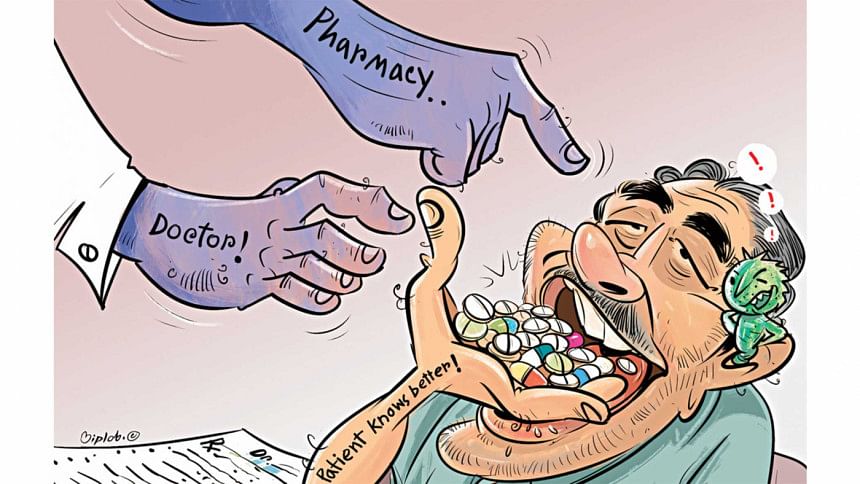Beware of antimicrobial resistance

It's been known for some time that antimicrobial resistance (AMR)—which occurs when bacteria, viruses, fungi and parasites no longer respond to antibiotics and other antimicrobial medicines—has become a global health threat. Now, a report by The Daily Star illustrates the level of danger we are in. It shows how not only are drugs becoming increasingly ineffective—due to intake of over-prescribed or self-prescribed medicines—but germs are getting drug-resistant as well. As a result, even common infections are becoming harder to treat, leading to higher medical costs, longer hospital stays, and increased mortality.
One example of this, as explained by a superbug expert at Bangabandhu Sheikh Mujib Medical University (BSMMU) in Dhaka, is the germ that causes typhoid fever. Over the past 20 years, two antibiotic drugs used to treat typhoid have been replaced as they've become ineffective against the water-borne disease. "If ceftriaxone [the antibiotic now in use] loses efficacy, typhoid will break out in the community," he said. Over 85 antibiotics are currently available in our country for treating different diseases. A surveillance study by BSMMU, which examined 1,250 bacteria collected from nearly 9,000 samples and tested around 30 antibiotics against those, found that there was not a single bacterium that wasn't resistant to at least one drug.
This is a shocking development. Experts say that gross misuse and overuse of antimicrobials are responsible for the development of these drug-resistant pathogens, and for some of the critical medicines becoming ineffective. For example, throughout the pandemic, doctors prescribed antibiotics unnecessarily to Covid patients in 83 percent of cases, according to a study by the IEDCR. As per another estimate by the health ministry, 60 percent of patients take medicines without consulting doctors or upon advice from informal providers like quacks and pharmacies.
Clearly, both doctors and patients, as well as policymakers governing various aspects of drug use, are responsible for this situation. The prospect of life-saving drugs no longer working is indeed a frightening one, which should worry us all. One solution to the drug resistance problem can be to bring in new drugs, which is a costly and time-consuming process.
A more sustainable solution is to restrict the use of antibiotics through proper policies. For one, sale of antibiotics without prescription should be prohibited. Also, physicians outside hospitals shouldn't be allowed to prescribe high-end antibiotics. To regulate the use of antibiotics, the health authorities may also create separate lists of antibiotics that registered doctors, consultants and doctors at hospitals can prescribe. We must take actions befitting the gravity of the danger for the sake of public health.

 For all latest news, follow The Daily Star's Google News channel.
For all latest news, follow The Daily Star's Google News channel. 



Comments